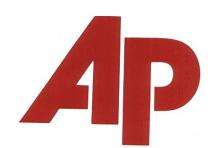AP 'news registry' to track online use

The US news agency the Associated Press, in a move aimed at protecting its content online, announced on Thursday it was building a "news registry" that would track the use of its stories on the Web.
The New York-based AP, a cooperative owned by more than 1,400 US newspapers, said that the news registry will "tag and track all AP content online to assure compliance with terms of use."
"The system will register key identifying information about each piece of content that AP distributes as well as the terms of use of that content, and employ a built-in beacon to notify AP about how the content is used," it said.
The creation of the news registry comes more than three months after the AP announced that it would launch an industry initiative to "protect news content from unauthorized use online."
The AP said the news registry will cover all AP text content by the end of the year and will eventually be expanded to cover AP photos and video.
It will be extended to AP member content in early 2010.
US newspapers have been grappling with a steep drop in print advertising revenue, steadily declining circulation and the migration of readers to free news online.
A 50,000-circulation Michigan newspaper, the Ann Arbor News, published its final edition on Thursday, the latest US newspaper to abandon print and go online only.
"What we are building here is a way for good journalism to survive and thrive," Dean Singleton, chairman of the AP board of directors and vice chairman and chief executive of MediaNews Group Inc, said in a statement.
"The AP news registry will allow our industry to protect its content online, and will assure that we can continue to provide original, independent and authoritative journalism at a time when the world needs it more than ever."
Jane Seagrave, AP senior vice president for global product development, told AFP the news registry was "an attempt to assert for ourselves the way we want our content used."
"The enforcement is separate," she said. "This is not primarily an enforcement action.
"It exists in a rights framework but it's to really start from the beginning and make sure we understand what happens to our content and follow it. It's an aid to licensing," she said.
Seagrave also said the format for the news registry was "open source." "We're happy to have others adopt it," she said. "This is a standard that we think is flexible and could be used by a lot of people and hope it is."
The AP said the news registry will give content owners and publishers "detailed metrics on content consumption, payment services and enforcement support."
Noting that it spends hundreds of millions of dollars every year gathering news around the world, the AP said "licensing of this content by our members is critical to support our news operations.
"In the new digital content economy, however, a significant amount of AP news and news from AP members is used without permission or fair compensation," it said.
"A content registry is a fundamental and powerful means to protect valuable and costly news content to assure that news organizations like AP can continue to support original journalism," it said
The AP also stressed that creation of the news registry was not aimed at bloggers or Google, whose Google News site has been criticized by some US newspapers for linking to their content without sharing advertising revenue.
(c) 2009 AFP




















